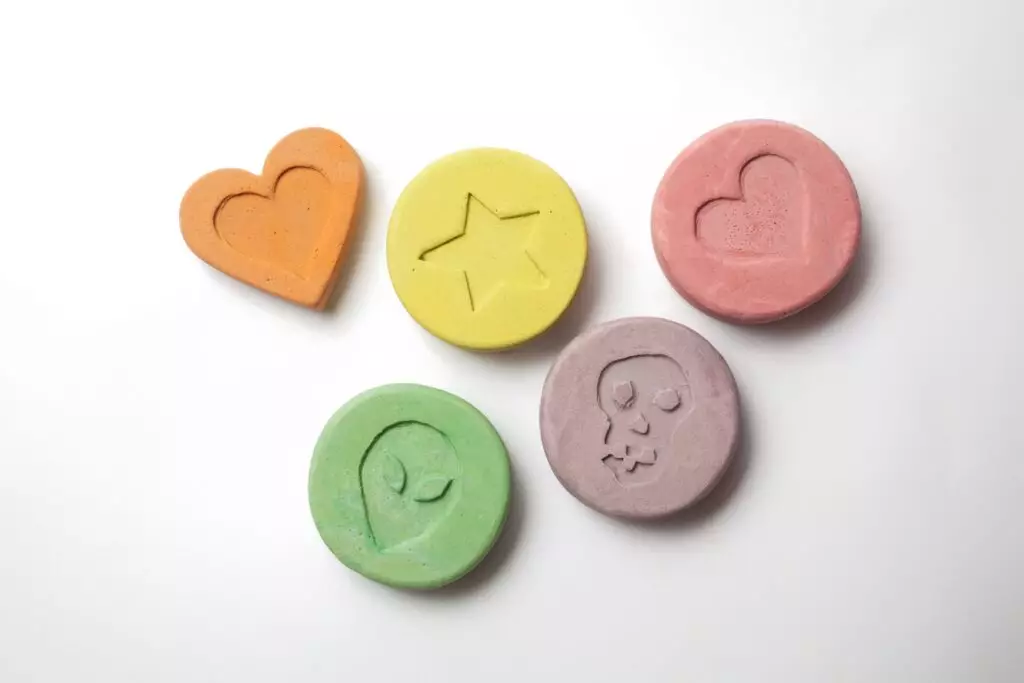Molly, a form of the drug ecstasy, was created more than a century ago by a German chemical company in hopes of making a safe and effective diet pill. Although it didn’t work as intended, molly’s psychoactive qualities were soon uncovered, and recreational use of the drug has become wildly popular at parties, nightclubs, and raves since the 1980s.
The effects of a molly addiction typically aren’t deadly, but certain molly withdrawal symptoms, such as increased heart rate, a spike in body temperature, and seizures, can be dangerous.
What is the Difference Between Molly, MDMA, and Ecstasy?
Some people think molly, MDMA, and ecstasy are separate drugs, but there are no significant differences between them. “Molly,” (or “molecule”), is basically just a simple term for the drug, which has an unwieldy chemical name — 3,4 methylenedioxymethamphetamine.
The University of Buffalo’s Clinical and Research Institute on Addictions explains that molly is widely believed to be a newer, safer, purer form of ecstasy. However, both molly and ecstasy are frequently cut with fillers such as caffeine, or dangerous drugs like heroin, meth, cocaine, cough medicine, or ketamine (an animal tranquilizer).
Most of the chemicals in molly originate in labs in China. Once it arrives in the United States, sellers often blend it with other substances to raise their profit margin. According to CCN Health, what is typically sold as molly may not contain any MDMA at all, but may be a toxic brew of other chemicals. Without a test, buyers can’t know what they’re getting.
Is Molly Addictive?
Can you become addicted to molly? Researchers aren’t sure about the addictive potential of molly, and studies have been inconsistent, however, it appears that it can be habit-forming.
The United States Drug Enforcement Administration (DEA), classified molly as a Schedule I drug, which means it has no currently accepted medical use and a high potential for abuse. Molly is substantially more dangerous when used with other substances like alcohol.
Many regular users report common signs of addiction, including using the drug despite negative consequences, problems at school or work, and loss of interest in activities customarily found enjoyable. Cravings and withdrawal symptoms when the drug is stopped are also signs of molly addiction.
How Molly Addiction Affects your Mind and Body
The side effects of molly are unique because the drug has stimulant properties similar to meth or cocaine, but also hallucinogenic effects similar to LSD. Molly pills and capsules are usually converted to powder for snorting or smoking, but injectable liquids are also available.
Molly users report feeling giddiness and euphoria, heightened energy and alertness, increased sociability, pleasure, warmth, enhanced sexual desire, happiness, and a distorted sense of time.
Other molly side effects that aren’t so pleasant may include:
- Increased blood pressure
- Increased heart rate
- Sensitivity to sound, light, and touch
- A sharp increase in body temperature
- Severe dehydration
- Sweating or chills
- Nausea
- Tremors
- Jaw clenching and teeth grinding
- Restless legs
- Headache
- Blurred vision
- Confusion
- Seizures
- Pain and stiffness in legs and lower back
- Restlessness and agitation
- Coma
Side Effects of Long-Term Molly Use
Many regular or long-term molly users say they have experienced a hard letdown when the high wears off, including severe depression, anxiety, and irritability. Researchers aren’t yet sure if the effects are reversible when the drug leaves the body, or if some damage may be permanent.
Long-term side effects of prolonged molly may include:
- Irregular heartbeat
- Aggression
- Severe panic attacks
- Sleep problems
- Suicidal thoughts or behaviors
- Muscle cramps
- Paranoia
- Loss of motivation
- Loss of sex drive
Although molly isn’t generally a deadly drug, users may experience an intense spike in body temperature, particularly at dance parties in hot rooms. There is considerable risk of heatstroke in such situations, with potential for heart, liver, kidney, or brain damage. Although it’s rare, death is possible.
Signs of Molly Withdrawal
People who have a molly addiction may experience severe cravings for the drug when stopping or cutting back. Common molly withdrawal symptoms include:
- Loss of appetite
- Fatigue
- Difficulty concentrating
- Impaired memory
- Depression
- Panic attacks
- Seizures
How Long do Molly Withdrawal Symptoms Last?
It’s impossible to say for sure how long the side effects of molly withdrawal will last because so many factors are involved. For instance, the length of molly withdrawal can depend on how long a person has used molly, the size of the doses, additives in the molly , whether it was used with alcohol or other drugs, and overall mental and physical health.
Treatment for Molly Addiction
Unfortunately, there are no medicines specifically for molly withdrawal treatment. However, a medical provider may prescribe medications to help with withdrawal symptoms such as nausea, headache, insomnia, anxiety, or depression.
If you are a heavy user of molly, or if you’ve used the drug regularly for a long time, a substance abuse treatment program is your best bet for recovery. Counseling, both one-on-one and group support, will help you understand why you used molly in the first place. Through treatment, you will also learn better ways of coping with stress.
You may be tempted to try stopping on your own, but you are more likely to be successful if you have professional support. The risk of relapse is substantially higher for people who try to stop using molly without help.
Seek Help Today for MollyUse
Although molly isn’t addictive in the same way as heroin or cocaine, it can still be habit-forming, and the side effects of molly withdrawal can be challenging. The detox process is easier with the support of qualified addiction professionals who can also help you manage any depression, anxiety, or stress. If you or a loved one is struggling with a molly addiction, please don’t hesitate to call us as soon as possible at (855) 425-4846, or contact us here for more information.

